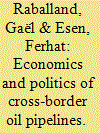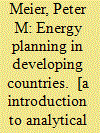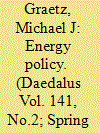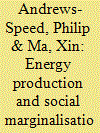|
|
|
Sort Order |
|
|
|
Items / Page
|
|
|
|
|
|
|
| Srl | Item |
| 1 |
ID:
122813


|
|
|
| 2 |
ID:
058149


|
|
|
|
|
| Publication |
Cambridge, RSC, 2004.
|
| Description |
xxxvi, 323p.
|
| Series |
RSC clean technology monographs
|
| Standard Number |
0854045465
|
|
|
|
|
|
|
|
|
|
|
|
Copies: C:1/I:0,R:0,Q:0
Circulation
| Accession# | Call# | Current Location | Status | Policy | Location |
| 049008 | 333.79/DEL 049008 | Main | On Shelf | General | |
|
|
|
|
| 3 |
ID:
077402


|
|
|
|
|
| Publication |
2007.
|
| Summary/Abstract |
The construction of cross-border pipelines requires large upfront investment and, because of transit through third countries, is subject to increased risk. We demonstrate that the decision to build cross-border pipelines in landlocked regions is influenced more by economics than by politics. Governments use transportation constraints to discriminate among foreign oil companies and to promote low-efficiency routes for political purposes. This paper describes strategies used by importers and oil majors to address this limitation, using the Caspian basin as a reference. Based on data obtained from oil professionals operating in the region, and professional journals, we highlight that, on average, transportation costs in the Caspian basin are up to six times higher than in the other oil-producing regions of the world.
This paper does not reflect opinions and views of EBRD. The authors would wish to thank Yelena Kalyuzhnova, Richard Pomfret, Martin Raiser and Dana Ward. This article was written prior to Mr. Esen having joined the EBRD and contains no data or information which Mr. Esen may have been privy to during the course of his employment with the EBRD.
|
|
|
|
|
|
|
|
|
|
|
|
|
|
|
|
| 4 |
ID:
091701


|
|
|
|
|
| Publication |
2009.
|
| Summary/Abstract |
This paper aims at developing an integrated approach for estimating the employment benefits associated with power-generation technologies. The proposed approach exploits the input-output methodology for estimating the direct, indirect and induced employment effects associated with the energy project in question, as well as two different valuation techniques, namely the "opportunity cost of labour" approach and the "public expenditures" approach, for expressing these effects in monetary terms. This framework has been implemented to estimate the employment benefits resulting from the development of a lignite-fired and a natural gas-fired power plant in Greece, taking into account all the stages of the corresponding fuel cycles that are undertaken domestically. The results of the analysis clearly show that lignite-fired electricity generation results in significant employment benefits amounting to 2.9-3.5 €/MWh in the basic scenario. On the other hand, the employment benefits associated with the examined natural gas unit were estimated at 0.4-0.6 €/MWh in the basic scenario. It is also worth mentioning that the significant environmental externalities of the lignite-fired electricity in Greece that have been presented in a number of studies can only be partially compensated by the estimated employment benefits.
|
|
|
|
|
|
|
|
|
|
|
|
|
|
|
|
| 5 |
ID:
132669


|
|
|
|
|
| Publication |
2014.
|
| Summary/Abstract |
Local citizen-led initiatives relating to energy are developing strongly in Anglo-Saxon countries and a growing body of research is examining their innovative potential. In France, similar grassroots initiatives - albeit with certain specificities - only began to emerge recently and so far, very few studies have dealt with them. The purpose of this article is to propose an exploratory and in-depth analysis of one advanced French case: Le Mené, a pioneer in local energy autonomy. We examine the conditions under which the initiative emerged and the processes through which a grassroots innovation is formed. In studying this case (interviews, analysis of documents), comparing it with other sources of data (expert interviews, comparative observation of other initiatives) and taking stock of various social sciences studies, we show that a social innovation was produced in Le Mené through the hybridisation of actors, sociotechniques and discourses. This initiative was innovative not only in terms of the scope of the mechanisms implemented, but also in terms of the social organisation behind the development of the projects and the capacity to use energy production as a social resource. Finally, we reflect on the possible diffusion of these grassroots initiatives and their policy implications in France.
|
|
|
|
|
|
|
|
|
|
|
|
|
|
|
|
| 6 |
ID:
042395


|
|
|
|
|
| Publication |
London, Westview Press, 1986.
|
| Description |
xv,169p.
|
| Standard Number |
086531649X
|
|
|
|
|
|
|
|
|
|
|
|
Copies: C:1/I:0,R:0,Q:0
Circulation
| Accession# | Call# | Current Location | Status | Policy | Location |
| 028190 | 333.791501724/MEI 028190 | Main | On Shelf | General | |
|
|
|
|
| 7 |
ID:
113143


|
|
|
|
|
| Publication |
2012.
|
| Summary/Abstract |
The United States was remarkably complacent about energy policy until the Arab oil embargo of 1973. Since then, we have relied on unnecessarily costly regulations and poorly designed subsidies to mandate or encourage particular forms of energy production and use. Our presidents have quested after an elusive technological "silver bullet." Congress has elevated parochial interests and short-term political advantages over national needs. Despite the thousands of pages of energy legislation enacted over the past four decades, Congress has never demanded that Americans pay a price that reflects the full costs of the energy they consume. Given our nation's economic fragility, our difficult fiscal situation, and the daunting challenges of achieving energy security and limiting climate change, we can no longer afford second- and third-best policies. This essay discusses the failures of the past and how we might avoid repeating them.
|
|
|
|
|
|
|
|
|
|
|
|
|
|
|
|
| 8 |
ID:
138386


|
|
|
|
|
| Summary/Abstract |
Hidden in this challenge with regard to energy security are great opportunities. Unlike many countries, India has a young population and therefore can reap the fruits of demographic dividend. With more than half of the India of 2030 yet to be built, we have an opportunity to avoid excessive dependence on fossil fuel-based energy systems and carbon lock-ins that many industrialized countries face today.
|
|
|
|
|
|
|
|
|
|
|
|
|
|
|
|
| 9 |
ID:
081279


|
|
|
| 10 |
ID:
132622


|
|
|
|
|
| Publication |
2014.
|
| Summary/Abstract |
This study explores different practices for accelerating the integration of generating facilities to the electricity network using smart solutions. Case studies from Great Britain, Republic of Ireland and Northern Ireland, and the Unites States of America were selected. The paper assesses and compares the different Principles of Access that have been implemented in these countries, such as Last-in First-out (LIFO), Pro Rata and Market-Based. The social optimality of these approaches is also discussed. The paper also evaluates how the risk (regarding curtailment and investment) is allocated between parties (distribution network operators, generators and customers). Even though the cases are diverse, important findings and lessons have been identified which may assist distribution network operators to address the issue of increasing the connection of distributed generation while managing efficiently and economically energy exports from generators.
|
|
|
|
|
|
|
|
|
|
|
|
|
|
|
|
| 11 |
ID:
127263


|
|
Factors influencing perceptions of domestic energy information: content, source and process
/ Simcock, Neil; MacGregor, Sherilyn; Catney, Philip; Dobson, Andrew, Ormerod, Mark, Robinson, Zoe Ross, Simon Royston, Sarah Hall, Sarah Marie
|

|
|
|
|
| Publication |
2014.
|
| Summary/Abstract |
Reducing household energy consumption is an essential element of the UK Government's carbon reduction strategy. Whilst increased knowledge alone will not necessarily lead to tangible actions on the part of consumers, knowledge of various kinds is, we argue, still important if domestic energy usage is to be reduced. In an attempt to 'educate' the public, governments have typically resorted to 'mass information' campaigns that have been considered largely unsuccessful. Yet understanding what alternative forms of learning could be cultivated has been limited by the dearth of research that explores whether and why people consider information about energy and energy saving to be useful. By exploring this, we can move towards an understanding of how knowledge about energy saving can be better shared and communicated, enabling more meaningful learning to take place. Drawing on in-depth qualitative data with fifty-five participants, this paper highlights a range of factors that affect perceptions of energy information. It argues that these factors are not discrete, but are interlinked. A fundamentally different model of knowledge exchange is needed for more effective learning about energy saving to occur. A number of implications for policy are proposed in our conclusions.
|
|
|
|
|
|
|
|
|
|
|
|
|
|
|
|
| 12 |
ID:
130464


|
|
|
|
|
| Publication |
2014.
|
| Summary/Abstract |
Nuclear power remains the best way to produce large amounts of electricity reliably for homes and businesses. That is why the continuing deficit in nuclear innovation is so troubling, and why Washington needs to seek additional strategies to incentivize and support progress.
These days, the long-term role that nuclear power will play in the global energy market remains uncertain. That would have come as a surprise to the scientists and engineers who, during the 1950s and 1960s, pioneered the study of nuclear fission, built test reactors, and designed nuclear-powered airplanes and rockets. They would also have been surprised, and likely dismayed, that the light-water reactor -- the technology that powered the first nuclear submarine, in 1954 -- remains the dominant commercial technology for producing fission energy.
|
|
|
|
|
|
|
|
|
|
|
|
|
|
|
|
| 13 |
ID:
130465


|
|
|
|
|
| Publication |
2014.
|
| Summary/Abstract |
The Defense Department is the United States' largest energy consumer, but it's also a major incubator of cutting-edge technologies. To cut fuel demands and meet new threats, the Pentagon is transforming the U.S. military from an organization that uses as much fuel as it can get to one that uses only as much as it needs.
In the immediate aftermath of World War II, the U.S. naval aviator Thomas Moorer questioned Takeo Kurita, a former vice admiral of the Imperial Japanese Navy, as part of the U.S. military's postwar interrogation of Japanese commanders. Kurita told Moorer that one of the most significant reversals of fortune Japan had suffered during the war was the loss of fuel supplies. "We ran out of oil," Kurita said, and by the end of the war, the Japanese military had grown so desperate, it was operating its equipment on fuel distilled from old tires, rice, and even pine needles. "What I learned then," Moorer would note years later, "was never lose a war, and the way to lose a war is to run out of oil."
|
|
|
|
|
|
|
|
|
|
|
|
|
|
|
|
| 14 |
ID:
132631


|
|
|
|
|
| Publication |
2014.
|
| Summary/Abstract |
Municipal solid waste (MSW) collection and disposal is a major urban environment issue in the world today. MSW management solutions have to be technologically feasible, legally and socially acceptable and environmentally and financially sustainable. European policy is pushing for a rational management of natural resources; a promising technological perspective today is waste valorisation, a process that involves sorting at the source, combined with material recycling and waste-to-energy conversion. In this paper, we analyze the evolution of the Portuguese MSW management system, criticize the environmental policy issues for MSW management in Portugal and identify weak points in the criteria used for the technologies selection. Portugal is facing multiple problems with MSW management and is attempting to tackle them by passing legislation in order to improve the performance of waste management systems. At the technological level, gasification increasingly presents as an efficient and viable alternative to incineration. Gasification is a waste-to-energy conversion scheme that offers an attractive solution to both waste disposal and energy problems. Waste gasification by plasma has been validated but the economic viability of this technology must be proven before to be accepted by the industry.
|
|
|
|
|
|
|
|
|
|
|
|
|
|
|
|
| 15 |
ID:
091555


|
|
|
|
|
| Publication |
2009.
|
| Summary/Abstract |
This article computes the energy productivity changes of regions in Japan using total-factor frameworks based on data envelopment analysis (DEA). Since the traditional DEA-Malmquist index cannot analyze changes in single-factor productivity changes under the total-factor framework, we apply a new index proposed by Hu and Chang [2009. Total-factor energy productivity growth of regions in China. Energy Policy, submitted for publication]: a total-factor energy productivity change index (TFEPI) that integrates the concept of the total-factor energy efficiency index into the Malmquist productivity index (MPI). Moreover, we separate TFEPI into change in relative energy efficiency, or the 'catching up effect,' and shift in the technology of energy use, or the 'innovation effect.' The data from 47 prefectures during the period of 1993-2003 are used to compute the TFEPI and its components for 4 kinds of energy. The TFEPI of electric power for commercial and industrial use changes ?0.6% annually, which can be separated into a total-factor energy efficiency change of 0.2% and a technical change of ?0.8%. The TFEPI for coal deteriorates by 1.0%/year, which is mostly caused by a decrease in relative energy efficiency change. We define and identify 'innovators' who cause the frontier to shift. Most regions identified as frontier shifters are located outside of Japan's four major industrial areas.
|
|
|
|
|
|
|
|
|
|
|
|
|
|
|
|
| 16 |
ID:
128648


|
|
|
|
|
|
|
|